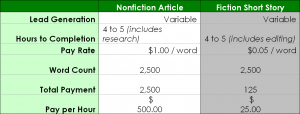I remember the days when the encyclopedia salesman would come to the door, selling leather-bound sets of books with gold-dusted pages. In those ancient caveman days, the biggest problem with the encyclopedias, was that they would quickly get outdated. Science, the global political landscape and technology are often always in flux, which caused the print version of the encyclopedia to be less valuable longer-term.
Read More…
Is Wikipedia Reliable for your Research?
Just How Long Does it Take to Make a “Name” for Yourself?
Fame, fortune and glory. Something that every writer dreams of, but no one is quite sure what being “famous” actually entails. Do you know who Robert Bloch is? How about Leigh Brackett or C.L. Moore? Each of these prolific writers hit it “big”: Bloch wrote the horror fiction that the movie Psycho was based on, Leigh Brackett wrote the screenplay for The Empire Strikes Back, and C.L. Moore’s groundbreaking contributions to fantasy and science fiction earned her the World Fantasy Award for Lifetime Achievement.
Being a writer means that we have to continually remind ourselves why we write; to the fickle public it never matters “what” we’ve done. It always seems to be “when” we do it that counts. I’ll never forget the first time I joined a community of writers. Bright-eyed and bushy-tailed, I was enthusiastic about how far I’d go as a writer and was eager to share ideas with other writers like myself. Then, I got told off by a very snarky writer who had written two books over 10 years ago–that I wasn’t a “real” writer because, at the time, I had zero “paid” credits to my name. To him, he was the “expert” because he had been published before and had gotten paid for it–but he was also bitter. Very bitter.
It’s easy for us to sit back and laugh at writers like this. Unfortunately, we are those writers. In 50 years, who will be remembered? Stephen King? Probably. You? Me? Probably not–yet.
Read More…
Fiction Editing: the Do’s and Don’ts of Editing Professionally
Now that I have some time this week to post, I’m going to pick up where I left off when I was discussing editing. Recently, we’ve talked about what an editor does and what the difference is between content editing and copy editing. Now I’d like to talk specifically about fiction, because the fiction process is one that’s important to understand both on the writer’s side, but also on the editor’s.
DOs and DON’Ts of Being an Editor
- Don’t: Reject someone’s work because they have no experience.
Do: Reject the work if the quality isn’t up to par.
Read More…
The Cost of Writing Fiction versus Nonfiction
Before I’ve offer you some suggestions on resources you can utilize to get published, I’d like to point out the financial aspect of writing. My only caveat to this post, is that parts of this post compare the difference between how much a short story pays versus what a nonfiction article might. Books and blogging are two entirely different matters, and I am doing everything I can to get some realistic figures and feedback in order to provide you with factual information. Regardless, the truth of the matter is that nonfiction pays more than fiction. Let’s take a look at some sample numbers for a 2,500 word article versus a science fiction short story.
The nonfiction rate came from a major magazine with a large distribution; the fiction rate is a “professional writer’s rate” advocated by the Science Fiction Writer’s Association. When you have a chance to sit down and look at all the different publishers yourself (the most common one being Writer’s Market’s paid subscription service, you’ll often see that nonfiction consistently pays more than fiction does.
What does this mean to you?
Read More…
Dollars versus Dreams: When Writers get Hung Up on “Measuring Success”
Dreams have no shape, they are whispers on the wind that tickle your senses and tease your mind. Full of possibilities, dreams are so easy because they don’t speak to the work required to achieve them. They’re ghosts and mirages that are just out of reach, easier to grasp because they seem to come from that part of you that creates. That part of you that still believes fairies are real and the boogeyman does exist. It’s not quite the same well that you draw your creativity from but close enough.
Your family and friends know “you” and the roles you play; they can’t get inside your head but they know you for who you are right now, right this minute. Your bank account knows your financial situation, because the dollars and cents add up telling you whether or not you’re really “making it” as a writer. Only you know how your dollars match your dreams; the two are not mutually exclusive because you understand that money is a means to an end.
But you’re stubborn, and you have a dream of selling lots of books and earning beaucoup dollars. Have you planned to get their with your long-term goals?
Long-term goals are two parts planning, a healthy dose of discipline, a sprinkling of wishes and a lot of flexibility. But those longer-term goals don’t come without achieving the balance between responsibility and creativity: you have to think outside the box and sometimes, you have to forget what money you have to do it.
Read More…

